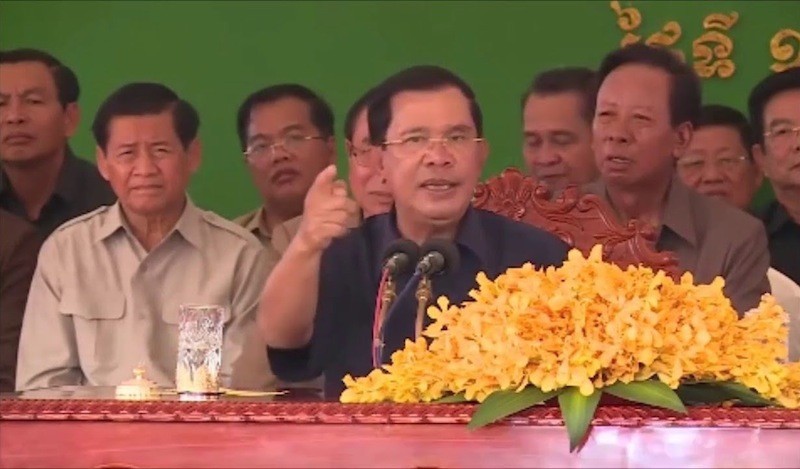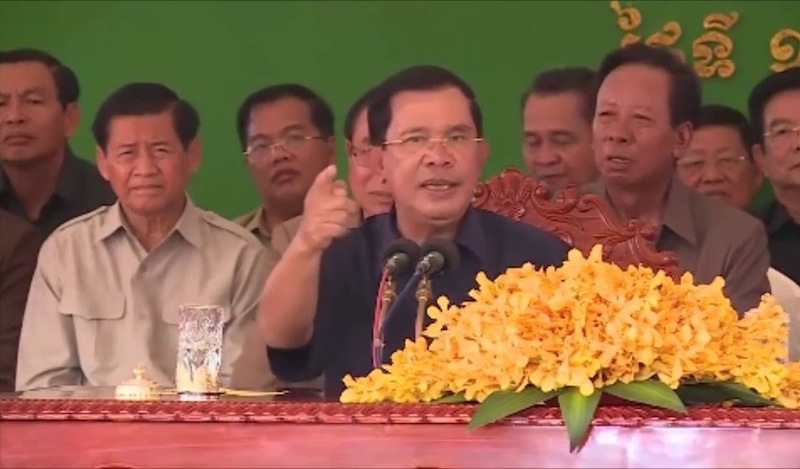Before leaving the country last month, the U.N.’s special rapporteur for human rights in Cambodia, Rhona Smith, decried what she said was the prevalence of cases where there was a “difference between what the laws say and then the implementation.”
Nowhere has this difference been more conspicuous since she departed than in the government’s sweeping reinterpretation of the article in the Constitution that prohibits a lawmaker’s arrest without consent from two-thirds of the National Assembly.
—News Analysis—

Jailing opposition lawmaker Um Sam An last week for social media posts made last year, the CPP government—which does not hold two-thirds of seats in parliament—said such a majority was not necessary because of an exception allowing arrests if a lawmaker is caught red-handed.
The claim relied on a clause in Article 80 of the Constitution, which gives lawmakers immunity from arrest, but makes an exception “in case of flagrante delicto”—when they are caught in the act of committing a crime.
“Don’t say you have immunity and they can’t arrest you, because it was an obvious crime,” Prime Minister Hun Sen said in a speech Tuesday, explaining that Mr. Sam An’s crime was still available for all to see.
“Now, at this hour, your [Facebook] page still talks about the fake maps,” Mr. Hun Sen said. “I don’t care that you’re an Assembly member or a senator.”
The CNRP lawmaker was duly charged hours later with committing crimes of incitement on April 9—he was arrested shortly after midnight April 10—even though he had made the posts about border demarcation some six months ago.
“Even if it happened in the past, it’s still considered ‘flagrante delicto’ from a legal and technical perspective,” Justice Ministry spokesman Chin Malin said last week.
“I give, as an example, that if Mr. Um Sam An killed someone and escaped but then returned, the police could arrest him because he committed an obvious crime, and everyone knows he did it before.”
Yet this broad interpretation of the “in flagrante delicto” clause had never before been put forward over the past 20 years, when the CPP could—and often did—secure the two-thirds vote to jail opposition lawmakers, and its introduction has not sat well with many.
Opposition lawmaker Son Chhay, defending Mr. Sam An at a press conference last week, argued that the clause was never meant to be a gaping loophole allowing for a lawmaker’s arrest when authorities claim to have clear evidence of a crime.
Instead, Mr. Chhay said, the clause was intended to cover the possibility of a lawmaker being caught in the act of committing a serious crime like murder, allowing police to intervene without waiting for the Assembly to meet and vote.
Yet even in a legitimate case of an “in flagrante delicto” crime, Mr. Chhay noted on Sunday, the exception is intended to be temporary, and does not allow—on its own—for prosecution to proceed, as it has in the case of Mr. Sam An.
“After they detain him, they have to get permission from parliament to lift his immunity to continue prosecuting the case,” Mr. Chhay said. “The Constitution says if you want to continue, you have to lift immunity, but the CPP do not have the numbers.”
The stipulation requiring approval by a two-thirds vote of the Assembly is also provided in Article 80.
“The accusation, arrest, or detention of an assembly member shall be made only with the permission of the National Assembly or by the standing committee of the National Assembly between sessions, except in case of flagrante delicto,” it says.
“In that case,” it stipulates, “the competent authority shall immediately report to the National Assembly or to the Standing Committee for decision.”
“The decision made by the Standing Committee of the National Assembly shall be submitted to the National Assembly at its next session for approval by a 2/3 majority vote of the Assembly members.”
“In every case above, detention or prosecution of a deputy shall be suspended by a 3/4 majority vote of the National Assembly members,” the article ends.
Mr. Malin, the Justice Ministry spokesman, said on Sunday that the final paragraph of the article was the basis of last week’s Assembly vote allowing for Mr. Sam An’s prosecution to go ahead despite his immunity remaining intact.
He denied that the absence of two-thirds majority approving Mr. Sam An’s detention prevented such a move for cases of “in flagrante delicto,” explaining that Mr. Sam An had simply failed to get the necessary votes to suspend his prosecution.
“The CNRP takes only one part for their explanation, but do not use the next phrase [about suspending the prosecution] to complete the meaning and if we want to understand the full meaning, we have to read the next paragraph,” Mr. Malin said.
“We were unable to find the three-quarters majority vote to stop the court’s procedures, so that’s why the National Assembly approved with 50-percent-plus-one to allow the authorities to continue with the arrest and detention of Um Sam An,” he added.
“The authorities understand that this was an obvious crime, and they don’t need to remove immunity.”
Yet Mr. Chhay said it was Mr. Malin who was selectively reading Article 80, adding that the CPP had invented the procedure where a simple majority allows authorities to continue detaining a lawmaker even without their immunity being stripped.
“They don’t have the numbers to remove immunity, so they have created this new law on their own of so-called ‘allowing to continue’ to detain Um Sam An with his immunity in place,” Mr. Chhay said.
“It is ridiculous, and it just means they have run out of ways to intimidate us following the law,” he said. “Now they will just openly abuse the law.”
Mr. Chhay’s view is shared by prominent lawyer Sok Sam Oeun, president of the Cambodian Defenders Project. Mr. Sam Ouen last week released a legal analysis arguing that even “in flagrante delicto” cases ultimately require immunity to be formally stripped.
“The Constitution provides the right for arrests in cases where the crime is an obvious crime, but after the arrest, they must send the case to the Assembly to decide to remove his or her immunity first, or to suspend the charges,” Mr. Sam Oeun wrote.
“From my understanding,” the lawyer added by telephone on Sunday, “if any lawmaker still has his immunity, he cannot be charged or detained. He must be released.”
“But the National Assembly, or the CPP parliamentarians, do not interpret it like this right now,” he added.
“This means immunity is nothing.”




